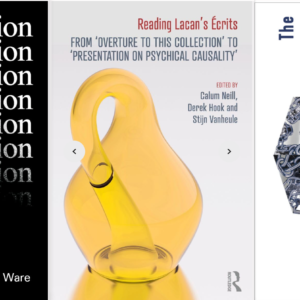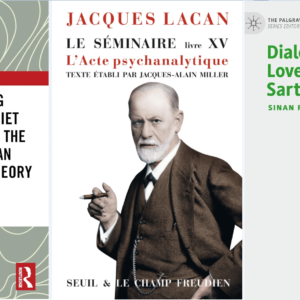News – March 2016
A podcast of Alexandre Stevens’ excellent talk in London last month on ‘Unlimited Enjoyments’ is now available thanks to the Backdoor Broadcasting Company. Hosted in London on 17th March by the MA in Psychoanalysis at Kingston University and the New Lacanian School, Stevens’ seminar addresses what he calls the “principles of limitation” or “modifiers to enjoyment” which can be used as markers of diagnostic orientation in the psychoanalytic clinic, or as possible restitution mechanisms for psychotic subjects. Drawing from his work as Director of the Belgian clinic Le Courtil specialising in the care of autistic youngsters, Stevens points to the ways in which these limit points can be used to indicate the form of jouissance available to the subject and the ways it can be controlled. As well as discussing his work at Le Courtil, his comments expand into a discussion on Lacan’s formulas of sexuation from Seminar XIX and XX, which Stevens reads as an expression of Russell’s paradox – they are “not a partition between men and women but between two logics of organisation”. The podcast will be especially interesting as preparatory material for the New Lacanian School’s Congress in Dublin in July on ordinary psychosis, as Stevens discusses some elements of the Joyce case which so fascinated the late Lacan (see especially Seminar XXIII, 11th May, 1976). As Stevens puts it, Joyce was through his writing “supplementing his body with something outside of his body”, contradicting the view that the episodes Joyce describes were indicators of schizophrenic or masochistic traits. The full recording is available here.
New interventions in the debate on ordinary psychosis continue to appear in the run-up to the NLS Congress on Discreet Signs in Ordinary Psychosis. Two notable contributions from last month are worthy of mention. Firstly is Veronique Voruz’s paper ‘Ordinary Psychosis – A creation of language for our times’, the text of a talk delivered to the London Society of the NLS in February. Voruz looks at the topic of ordinary psychosis by tracing the development of the concept through a number of ‘quilting points’ in Jacques-Alain Miller’s work: from the latter’s introduction of the term at the Antibes conference in 1998; his subsequent foregrounding in the 1998-99 lecture series on the symptom as a body-event; to Lacan’s “renunciation of ontology” in 2011. As preparatory reading to the theme of the Congress in July this piece is highly recommended. Secondly, the NLS Messager published six extracts from Pierre-Gilles Guéguen’s 2013 article for Culture/Clinic, ‘Who is Mad and Who is Not? On Differential Diganosis in Psychoanalysis’. As with Voruz’s paper it provides a valuable explication of the uses of the term ‘ordinary psychosis’ and its justification as a clinical category. The full article is hosted by the ICLO-NLS here.
March saw two new podcasts from the New Books in Psychoanalysis network. First is Jean-Michel Rabaté’s interview with Michael Mungiello about his 2014 book The Cambridge Introduction to Literature and Psychoanalysis. Rabaté’s main theoretical orientation is Lacanian, but all schools’ treatments of the topic are discussed, framed by the twin poles of hysteria and paranoia towards Rabate’s conclusion that “literature makes us ambassadors of the unconscious”. As Rabaté was a Joyce scholar prior to his interest in psychoanalysis – and was present at Lacan’s Seminar XXIII on the sinthome – Rabaté’s comments on this late era of Lacan’s teaching are especially interesting. Second is Anna Fishzon’s interview with Colette Soler discussing her Lacanian Affects which received its English translation by Bruce Fink earlier this year. Soler speaks in French but with a translation kindly provided by Annie Muir. A translation of Soler’s Lacan, Reader of Joyce is also forthcoming from Karnac later this year.
Text of Domenico Cosenza’s talk ‘Body and Language in Eating Disorders’, delivered to the Irish Circle of the NLS from 6th February, is now on the group’s site. Cosenza’s approach is relevant both to the theme of the upcoming WAP conference on ‘The Unconscious and the Speaking Body’ and the NLS Congress in Dublin on ‘Discreet Signs in Ordinary Psychosis’. He approaches the sinthome as a “condensation of jouissance without meaning…. That is, as such, centred on the body, and [which] presents itself as an “event of the body””. In the place of the Freudian unconscious, Cosenza substitutes the Lacanian category of the parletre (a neologism for the speaking-being). His central thesis is that eating disorders are symptoms of the latter rather than the former. Anorexia, for instance, is for Cosenza “a writing of the body not constructed on the logic of the signifier, but rather on the letter of jouissance”. He offers an interesting interpretation of bulimia or binge eating, where the ‘Moments of Crisis’ (to borrow the subject of the NLS Congress last year) experienced by these subjects, point to their “inability to exist in the interval between signifiers”. This is used to account for why bulimic crises and binge eating episodes occur during a hiatus or disruption in the subject’s routine, perhaps an unexpected delay or window of time through which these symptoms emerge. For Cosenza, we might therefore understand eating pathologies as what he labels “temporal interval pathologies”.
Among upcoming events, the first annual conference for LACK – a new organisation devoted to the promotion and development of Lacanian psychoanalytic theory – will be held at Colorado College, in Colorado Springs, on 22nd-23rd April. With the topic ‘Psychoanalysis and Freedom’, it will include keynote speakers Richard Boothby, joan Copjec, Mari Ruti and Alenka Zupancic.
Starting on 23rd April in London is the summer term of public lectures from the Centre for Freudian Analysis and Research. Its programme includes a short course on beginning the treatment. Seminars are held on Saturday mornings and the full schedule is available here on its site.
Further ahead, ‘Transgender, Gender & Psychoanalysis’ will be the theme for next Spring Conference of The SITE for Contemporary Psychoanalysis, the date for which was announced last month as Saturday 11th March, 2017. Patricia Gherovici will be the guest speaker. Gherovici’s work on the topic is well-known, as author of 2011’s Please Select Your Gender and two forthcoming works, Psychoanalysis Needs a Sex Change (due out later this year) and the collection Lacan, Psychoanalysis and Comedy of which she is editor, due out in October.
As a taster, there is a great interview with Gherovici in the LA Review of Books which appeared in February. Gherovici offers her perspectives on the contribution of psychoanalysis to trans issues: from Caitlyn Jenner and what Gherovici refers to as the “democratizing of transgenderism”, to writing as a complementary act to embodiment in a new gendered identity. Gherovici has an acute ear for soundbites, and the interview contains some nice examples: “The couch is a window into anthropology”; “The trans experience reawakens psychoanalysis, it cannot fall asleep on the couch, theoretically”; and “the unconscious is the last activist” to cite a few. Interestingly, she also disputes the widely-held view in Lacanian circles that all trans subjects are psychotic. “I argue for depathologization and tend to think of trans symptoms”, she says, with the ‘symptom’ understood by her as “a sort of creative solution that makes life liveable”.
Video of Bruno de Florence’s Iconea talk ‘Ignorance is a Passion’, delivered at the Institute for Musical Research last month, is now available on YouTube. De Florence discusses what music has to do with psychoanalysis, arguing that classical music and pop music share the same structure, tracing their development from the Roman or Gregorian chant to the contemporary I-V-I structure of pop music. De Florence looks at how musicologists, composers and musicians can make use of categories such as jouissance, the unconscious, and the real introduced by psychoanalysis.
On Saturday 9th April Petros Patounas will be giving a seminar at the Cyprus Society of the School of the Freudian Letter with the title
“Leadership and Orientation: Freud, Machiavelli and the Orientation of the Treatment.” Patounas will discuss capitalism, Machiavelli, ‘How To’ theories and cognitions on teaching and learning the attributes of leadership. The talk will include Freud and Lacan on the orientation of the ethic of desire, with the argument that a true leader causes desire. The seminar’s announcement is here.
Finally, the full programme for the World Association of Psychoanalysis Congress in Rio was finalised in March and is now available at www.congressoamp2016.com. It is currently available in Portuguese, French and Spanish, but will soon also be translated into English and Italian.
Got news? Get in touch.




Leave a Reply